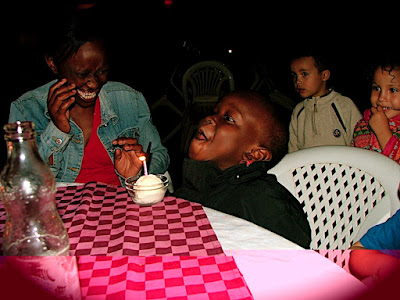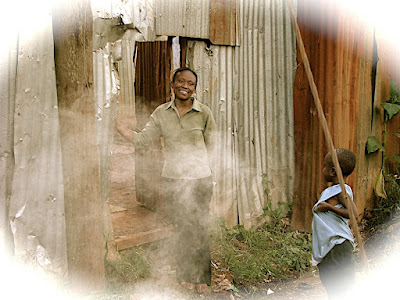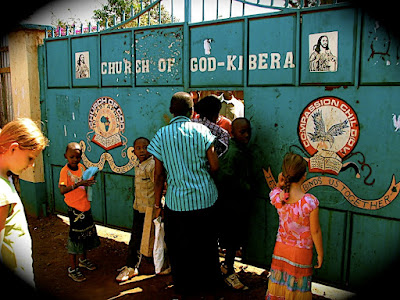Learning who to trust is a big adjustment for us in our new life here. Kids who are strangers will walk up and say “Give me money!” Youths sometimes grab Grace or Isaiah’s arms and ask for me to give them just one of my kids. Sometimes people are simply asking for work or promising a quality piece of furniture, but the story they spin isn’t quite “right.” A lot of conversations I have on the street I find myself wondering how much truth there really is to this story.
There are many drops of fresh water in what sometimes seems like a sea of cons, and every chance I can spend time with them is truly refreshing.
Baba Brian, as the kids call him, or Wycliffe, is more than a reassuring realization that the world is not all bad ... he is an inspiration to me.
His dad took a second wife when he was a young guy. The family was left to fend for themselves. His mom decided to come to Nairobi for opportunity, and eventually Wycliffe told us he was living on a trash heap near a nearby market.
He went to a church school and made friends with a couple missionaries. “Thanks to God, so many people have given me work!” he kept telling me. I kept trying to tell him a lot of it was his eagerness to work and being someone they can trust.
“No, thanks to God I have been given so much work.”
Wycliffe was able to live in nearby Kibera with his wife and son. One day he was given a radio to take home, and disaster struck that night. Three guys burst into the shack and took the radio. Then they turned towards his wife, Saleen. Wycliffe realized they weren’t going to stop with the radio. He grabbed one of the thugs and threw him against the wall, on top of the second thug. The third attacker lunged at him with a knife. He got an arm up and deflected the thrust just in time as the blade plunged into the top of his right shoulder. He fought them off, but decided the next day it was time to move.
So he continues to work hard to pay for the higher rent demanded of a safer neighborhood, and despite a poor example handed to him of what fatherhood means, he is determined to provide for his small family.
Brian is his one and only son (moms and dads here are called by their firstborn’s name when addressed with respect, therefore Baba Brian). The Saturday before last was his birthday. We got together with another AIM-AIR family that are also a part of Wycliffe’s life and took them to eat at a really cool kid friendly Chinese restaurant.
Between the two missionary families, we tried to think of all possible foods that would be a new experience for them. Wycliffe and Saleen bravely faced the new cuisine while Brian and the kids immersed themselves in the abundance of toys scattered around.
Every dinner comes with complimentary ice cream scoop in a dish, and I asked the owner if they could do something special for a birthday. So Brian’s ice cream came with a lit candle and the staff sang to him.
Wycliffe told us that they will remember this as the night they forgot ugali. Ugali is their staple food, and by staple I mean it’s there for every supper.
Yesterday we went to visit Wycliffe’s house. It is in the back of someone’s property amongst rows of corrugated steel shacks. A one room home that we were warmly invited into. Fortunately today was cool enough that the temperature inside was bearable. They don’t typically spend much time inside during the day.
The electricity was on today. We could hear the televisions from next door cranked up. The train rolls by less than 30 feet away. The property under the shack is easement for the railroad.
Wycliffe shared with us a dozen photos from his life, while Saleen made chai on a kerosene burner.
Wycliffe had asked we bring a DVD player so Brian could watch a DVD someone had given him. It was a collection of sing a long songs from the US. Brian has just started school, and is overcoming a hearing problem. Wycliffe desperately wants him to learn to speak English well.
Isaiah brought a toy train to share with Brian, and when that came out, the DVD was ignored.
Brian plays with the train while Isaiah sits at Brian's desk. Like a lot of the furniture, Wycliffe found it somewhere (much to Saleen's dismay :) and brought it back to life.
After chai, and home roasted peanuts, Wycliffe showed us around outside. There is no shower, but there are three out houses for everyone. Out the back door to the compound is the train track and a trash pile. Wycliffe told us a lot of rats live there, and cause problems at night. Breanna said they need a cat, and he laughed saying some people have a hen, and the cat would cause problems there.
Before we left, Saleen prayed for us, and Wycliffe thanked us for everything. Brian ran ahead to our car. As we pulled away he was bawling.
Wycliffe and his family have left a big impression on us, and I think we all had a lot to dwell on on the ride home.
Thanks to God for allowing us to be friends with them.




























